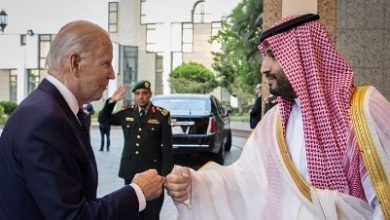Mohammed bin Salman and corruption… two sides of the same coin

Crown Prince Mohammed bin Salman and his ruling team are promoting their plans and efforts to combat corruption, but facts prove that MBS and corruption are two sides of the same coin.
This confirms the low rank of Saudi Arabia in the 2021 Anti-Corruption Index issued by Transparency International, as Saudi Arabia ranks 52nd globally with 53 degrees in transparency standards.
Observers are unanimous in highlighting the reality of widespread corruption in Saudi Arabia under the rule of a single individual and the spending of the kingdom’s capabilities and wealth on failed personal projects without any parliamentary or popular oversight.
The Saudi media has repeatedly promoted Mohammed bin Salman’s efforts to combat corruption by supporting competent authorities and committees.
Many regulations, developments, and amendments followed, including the issuance of the royal order in November 2017, to form a supreme committee headed by the Crown Prince, with the membership of the head of the Oversight and Investigation Authority, the head of the National Anti-Corruption Authority, the head of the General Audit Bureau, and the Attorney General.
However, evidence gathered that Mohammed bin Salman used the Saudi Anti-Corruption and Control Authority, Nazaha, to enhance his powers and serve his authoritarian regime.
This is supported by what was revealed by the French Intelligence Online website that Mohammed bin Salman is covering up the corruption of two branches of the ruling “Al Saud” family in Saudi Arabia while targeting other branches under the slogan “fighting corruption,” referring to the businessman Abdullah Al-Shugair as an example of double standards of the crown prince.
The site stated that those close to the “Mishaal” and “Sultan” branches, the two brothers of the kingdom’s founder, Abdulaziz Al Saud, are safe from Bin Salman’s alleged anti-corruption campaign. They have little to fear from him, despite the evidence of the corruption of many of them, according to the website.
The website, concerned with intelligence affairs, stated that Al-Shugair is one of the former close associates of Mishaal bin Abdulaziz, who played a pioneering family role as head of the Allegiance Council in Saudi Arabia, which consists of the sons and grandsons of the founding king, and therefore had an important role in the king’s rise.
The website also added that the Saudi Control and Anti-Corruption Authority, known as Nazaha, responds only to Bin Salman and has not taken any action against Al-Shugair despite documented evidence of his corruption in the deal to supply bulletproof vests to the Royal Guard.
This evidence dates back to 2019, when the American company Defense Tech submitted 70-page documents to Nazaha, including proof that Al-Shukair stole the intellectual property of bulletproof vests.
The documents stated that Al-Shugair owed $5.6 million to Defense Tech after he played the role of mediator in the sale of 10,000 jackets to the Royal Guard, who paid more than $40 million, in 2014, for the deal.
According to the documents, Al-Shugair led a plan to sell replica jackets of the Royal Guard instead of Defense Tech jackets, with the participation of officials of the Saudi Ministry of Interior, including Saeed bin Abdullah Al-Qahtani and Khaled Ibrahim Al-Luhaidan.
Although some US officials considered that Defense Tech provided strong evidence of Al-Shugair’s corruption, Nazaha did not take any action against him, as confirmed by Intelligence Online sources.
The sources explained that the chief legal advisor at the Saudi Military Industries Company, John Vincent Lonsberg, discovered that some clauses in the consulting contracts between Saudi defence companies and the Newton company owned by Al-Shugair are considered “mediation agreements”, which is prohibited by Saudi law.
Bin Salman continues to target other branches of the Al Saud as part of his alleged anti-corruption campaign and leads “purging” operations targeting agents close to the former Saudi monarch, King Abdullah bin Abdulaziz, and the former crown prince, Muhammad bin Nayef.
The sources of Intelligence Online revealed that on October 28, the Saudi authorities sent an arrest warrant to the International Police Organization Interpol to track down the two brothers, Salah and Mansur Fustuk. The sources noted that Bin Salman determined to arrest them, claiming corruption and financial misconduct.
The sources indicated that Salah Pistachio is the father-in-law of Prince Miteb, son of the late Saudi King Abdullah bin Abdulaziz, and was a significant player in concluding arms contracts for the Saudi National Guard for decades.
According to the sources, Prince Miteb is still under house arrest and cannot leave Saudi Arabia due to accusations against him as part of Bin Salman’s anti-corruption campaign.
Also, all those close to Bin Nayef, such as the former intelligence official Saad Al-Jabri and the businessman Nader Turki Al-Dosari, face constant legal prosecutions, similar to those faced by the former crown prince himself, who suffers from health problems and is still under house arrest.





